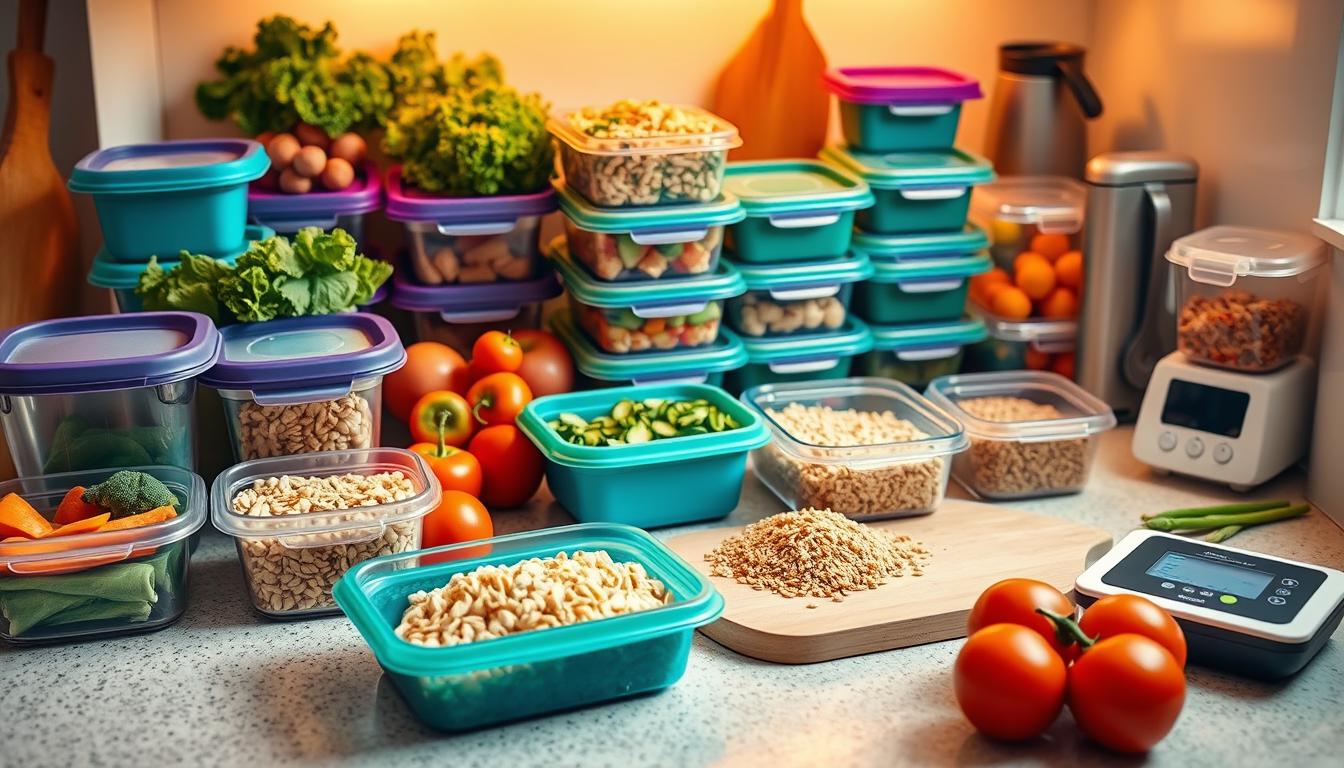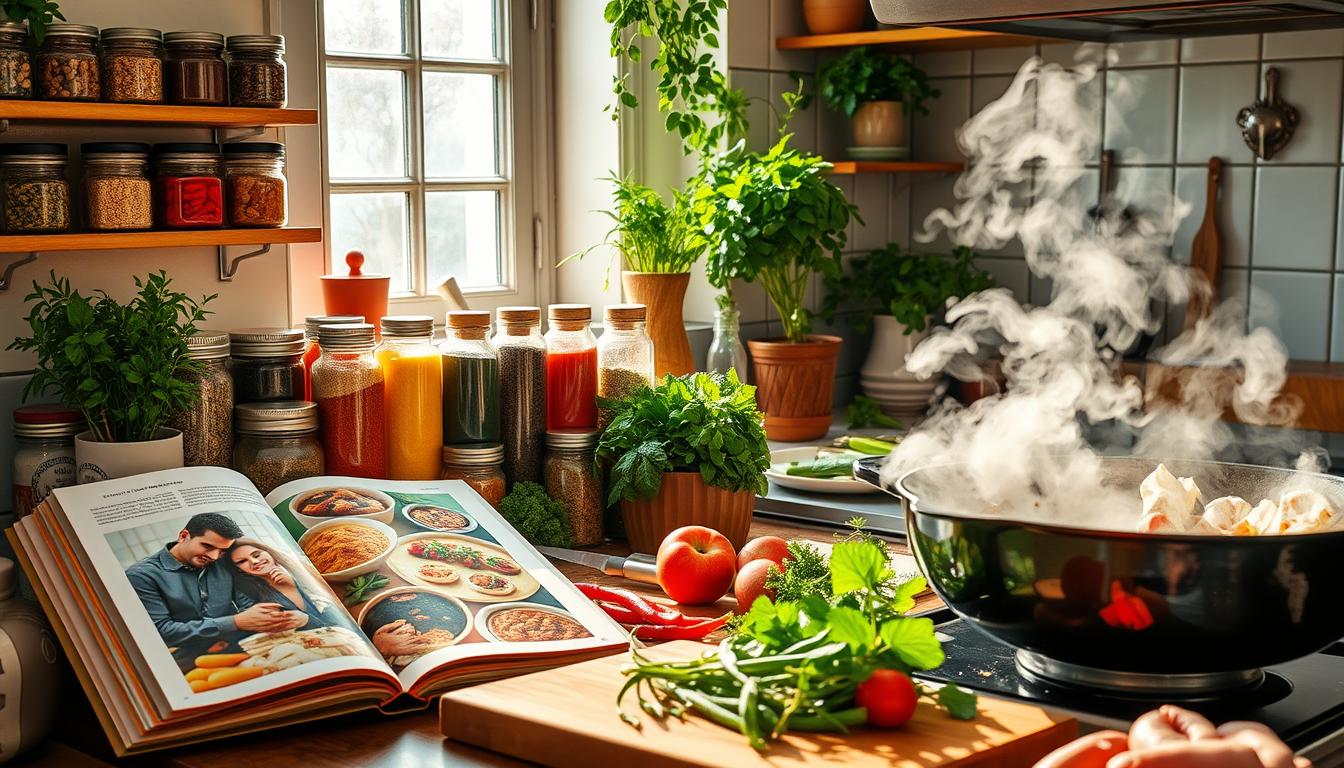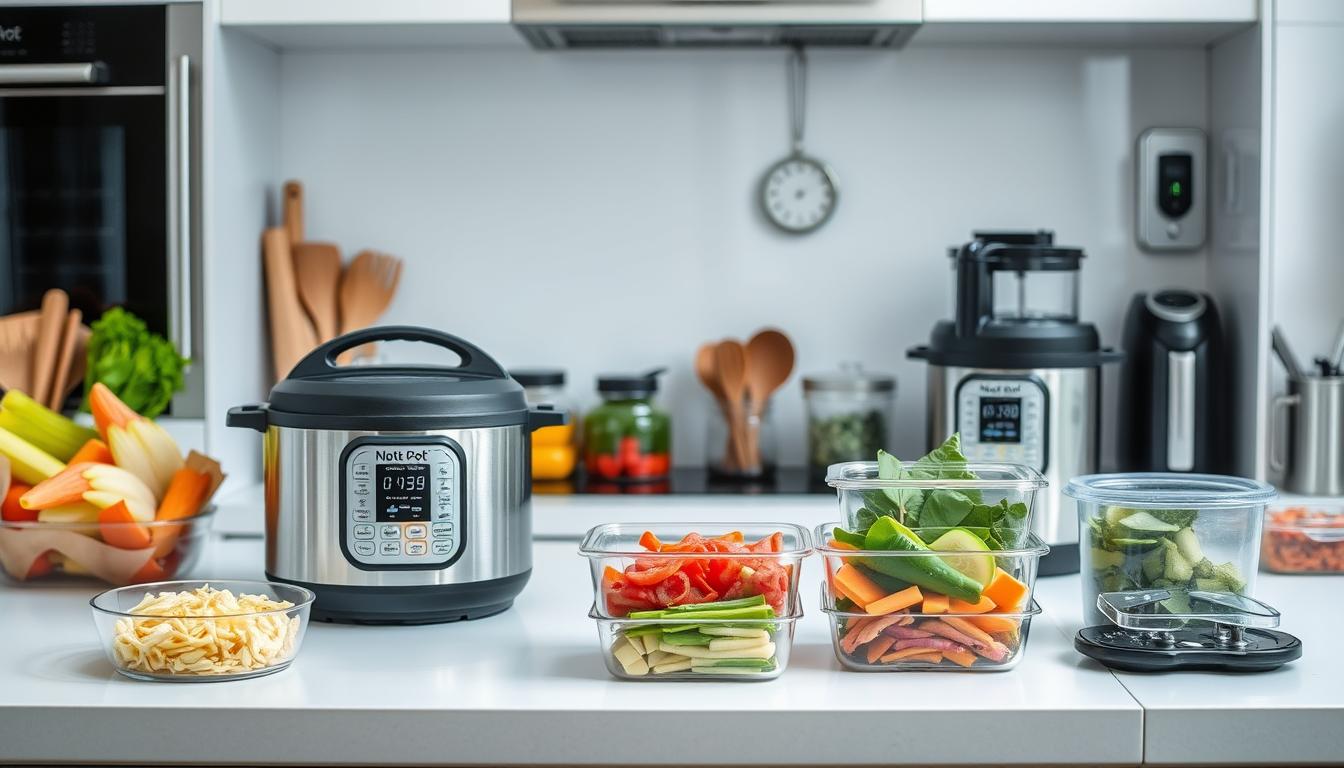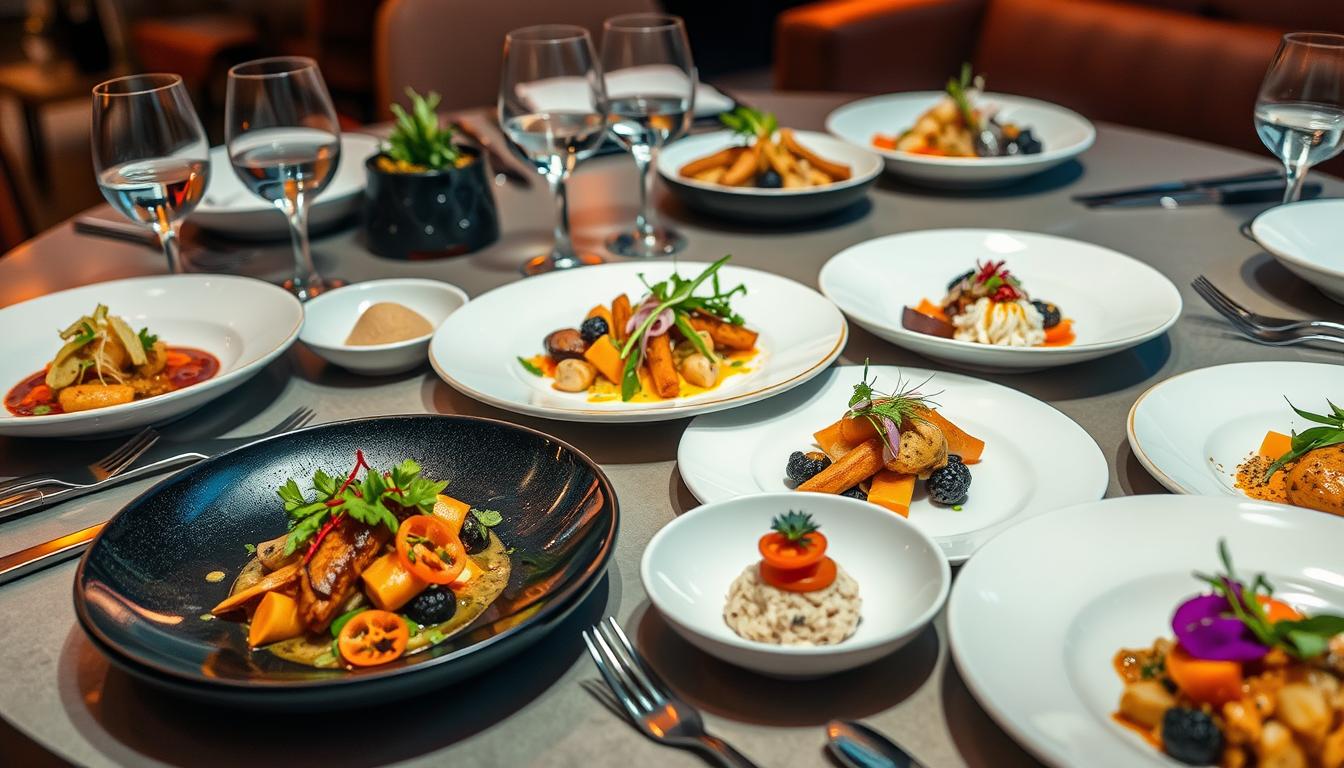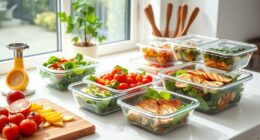Imagine walking into your kitchen on a busy Tuesday evening, and instead of feeling overwhelmed by the thought of what to cook, you open your fridge to find meals lined up, ready to eat. This sense of calm is not a fantasy; it’s the power of meal prepping at work. Meal prepping for the week allows you to reclaim your time and energy, enabling you to focus on what truly matters in your life. With the right meal prep ideas and a bit of planning, you can transform chaotic weeknights into peaceful mealtimes without breaking a sweat.
In a world that constantly demands more of your time, prioritizing easy meal prep can make all the difference in maintaining a healthy lifestyle. This guide will provide you with the essential tips and insights needed to create a streamlined meal prep process, ensuring you have nutritious options on hand that align with your busy schedule. Let’s dive in and explore how investing just a few hours can enrich your week with healthy meal prep strategies that simplify your dining experience.
Key Takeaways
- Meal prepping saves time and helps in sticking to a grocery budget.
- Planning meals in advance can foster a balanced diet and promote nutritional goals.
- Sunday is a popular day for meal prep, maximizing efficiency for the week ahead.
- Batch cooking allows multiple meals to be prepared with minimal effort.
- Investing in quality storage containers can enhance your meal prep organization.
- Prepping meals ahead can significantly reduce food waste.
Introduction to Meal Prepping
Meal prepping has become a popular strategy for simplifying your weekly food preparation while promoting healthy eating habits. This practice allows you to set aside a specific time in your week, often on a Sunday, to prepare meals or ingredients for 3-7 days in advance. With proper meal planning, you can enjoy fresh, nutritious meals while minimizing the uncertainty that often leads to unhealthy snack choices.
Understanding the importance of organization in the kitchen cannot be overstated. Meal prepping not only eases your daily cooking routine but can also significantly reduce overall grocery costs. Preparing meals in advance contributes to adhering to dietary goals, making it easier to stick to healthy eating practices. It is essential to remember to start small. Evolving from simply packing leftovers to tackling one recipe at a time can build your skills and confidence.
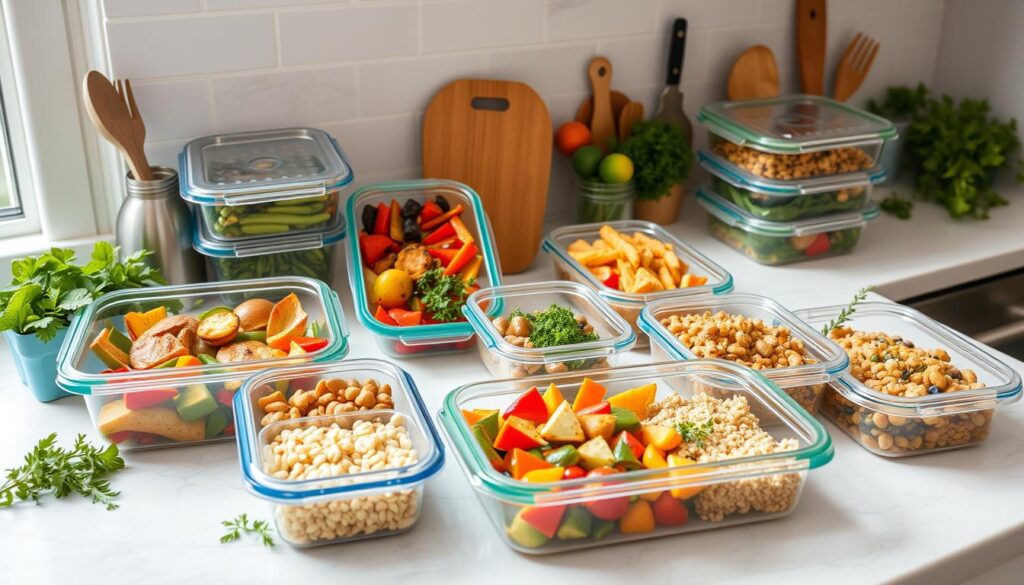
Utilizing the right meal prep containers is crucial for maintaining food quality. Whether you prefer reusable plastic containers, glass jars, or metal bento box styles, investing in high-quality options ensures that your meals can stay fresh for up to five days. By creating an environment where healthy food is readily accessible, you significantly enhance your chances of making better meal selections throughout the week.
Ultimately, meal prepping lays the foundation for a successful week of healthy eating. Following basic meal prep formulas, such as a protein, grain, and vegetable combination, can yield balanced, nutritious dishes. This thoughtful approach to meal planning helps ensure you save both time and money while making meal prep a sustainable part of your lifestyle.
What is Meal Prepping?
Meal prepping refers to the practice of preparing complete meals or individual ingredients in advance for easy assembly and consumption later. It encompasses two primary interpretations: cooking full meals in batches to enjoy throughout the week and preparing varied ingredients that can be mixed and matched into different recipes. Understanding meal prep definitions allows you to tailor your strategy, making meal prep vs. meal planning a vital consideration in your routine.
This method thrives on efficiency. Many individuals batch cook between three to seven days of food at a time. Some enthusiasts even choose to repeat the same meal multiple times during the week to minimize cooking time. Key to effective meal prepping is focusing on a balanced diet that includes complex carbohydrates, lean protein, fresh fruits, vegetables, and healthy fats. A recommended ratio for creating wholesome meals is one part protein, one part carb, and four parts fruits and veggies.
Proper storage plays a significant role in meal prep; cooked meals typically last about four days if stored appropriately. To maintain freshness, some prefer to cook on weekends and again midweek. Breakfast favorites like overnight oats make for convenient meal prep options.
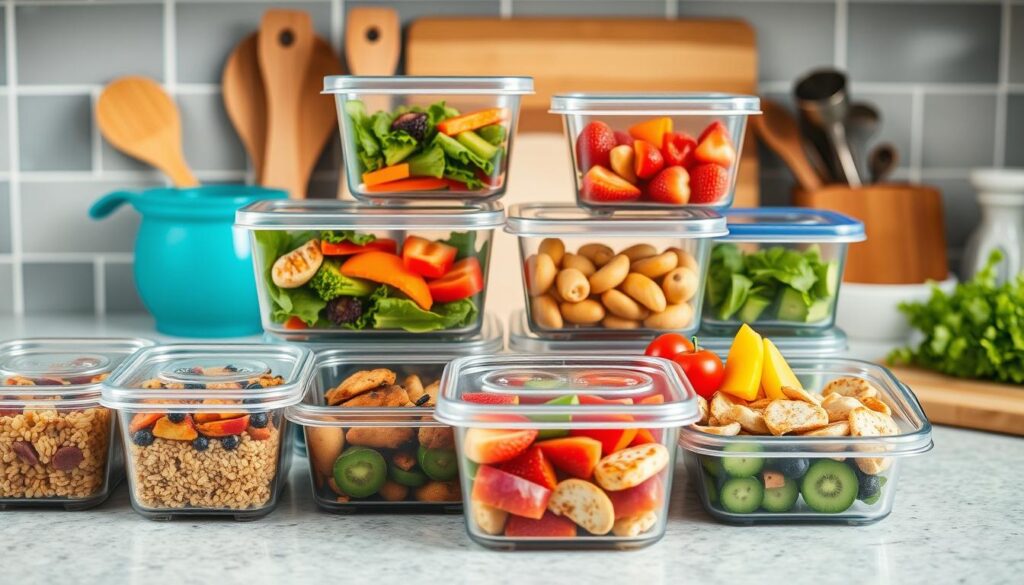
When it comes to reheating, the microwave is a trusty companion for many meal preppers. Most meal prep recipes are designed to maintain quality for four to five days. Cooked meats, such as chicken, have a shelf life of about five days, while fresh greens like spinach and lettuce may begin to wilt after five to seven days. To extend the life of your meals, consider freezing items like soups or stews, which can last up to three months. Sauces and salad dressings can retain their freshness for weeks or even months, depending on their ingredients.
Understanding these aspects of meal prepping enables you to create a system that works for you, combining convenience with healthful eating.
Benefits of Meal Prepping for the Week
Meal prepping offers numerous advantages that many find appealing, particularly those aiming for a healthier lifestyle. One of the biggest benefits of meal prepping is saving time during your busy week. Planning and preparing time-saving meals in advance means you won’t be scrambling every day to decide what to cook.
Another significant advantage relates to budgeting. By organizing your meals before heading to the grocery store, you can effectively manage your food expenses. No more impulse purchases; a concise shopping list can lead to healthier choices and reduce food waste.

Stress reduction is an important factor in maintaining a balanced life. Having ready-to-eat meals allows you to skip the last-minute dinner debates. A typical week becomes smoother without frantic cooking or takeaway runs, which often lead you towards unhealthy, calorie-laden options.
With meal prepping, you have full control over your ingredients and portion sizes. This flexibility supports you in managing dietary restrictions and building a healthy meal prep routine tailored to your specific needs. A well-thought-out approach to meal preparation can contribute to weight management while ensuring that the meals are nutritionally balanced.
All these benefits underscore the importance of meal prepping. Starting with small steps, like prepping for just a few days at a time, can lead to lasting positive changes in your diet, daily routine, and overall health.
Steps to Efficient Meal Planning
Efficient meal prep begins with a well-structured meal planning system. Start your week by setting aside time every Friday to create a meal plan that spans Monday through Friday. This approach helps you save time and reduces stress during the week.
- Review Your Schedule: Look at your calendar for any social events or commitments. This will help you plan meals that fit your lifestyle.
- Check Your Pantry and Freezer: Before finalizing your meal plan, assess what ingredients you already have. This not only saves money but also minimizes food wastage.
- Select Recipes: Choose recipes that you and your family enjoy. Planning around shared ingredients can streamline your grocery shopping. Consider meals like stews, chilis, or quick 30-minute dinners.
- Fill Out a Planner: Plug the meals into a planner. This emphasizes structure and allows for flexibility if plans change.
- Create a Grocery List: Align your list with the meal plan to make shopping trips quicker and more efficient.
- Adapt and Involve: Be open to adjusting your meal plan as needed. Involve family members in meal choices to ensure everyone is happy with the options.
Integrating technology, such as Google Sheets, can aid in organizing meal plans and grocery lists. For those new to meal planning, consider starting with just two or three days at a time, gradually building confidence. You might also try preparing larger portions for leftovers, making the meal prep process even more efficient.
Utilize one-pot dishes to reduce cleanup and rely on handy ingredients like frozen vegetables to speed up prep time. Having a variety of recipes at your disposal, along with a solid meal plan, will make your efficient meal prep a success.
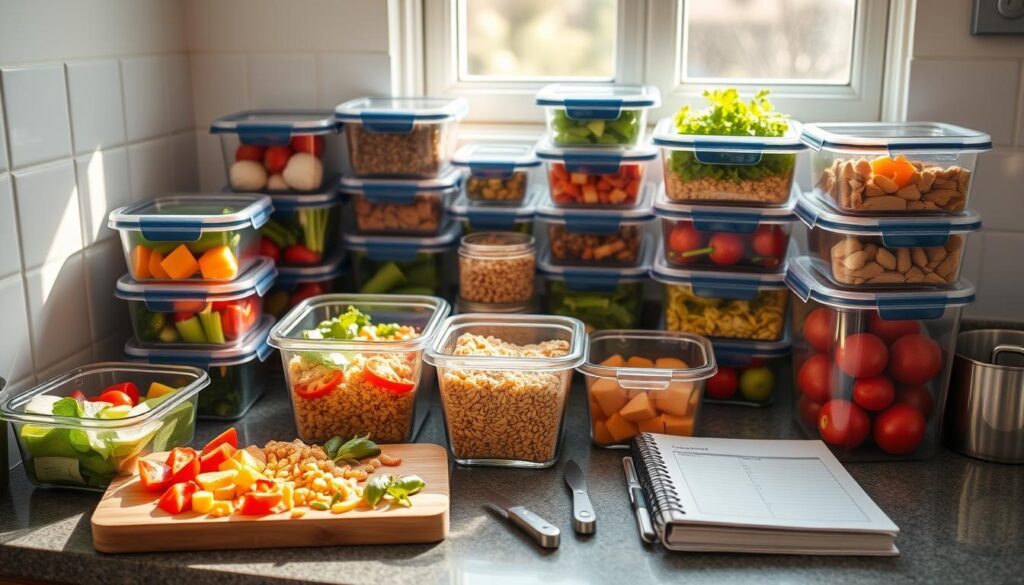
Essential Meal Prep Tools
Equipping your kitchen with the right meal prep tools transforms your cooking experience. High-quality knives facilitate chopping and slicing essential ingredients with ease. Food processors take the hassle out of meal prep by quickly chopping veggies, mixing ingredients for salads, or blending chickpeas for recipes like falafel. These efficient kitchen gadgets for meal prep save precious time, especially during busy weekdays.
Airtight containers play a vital role in keeping prepped foods fresh and make storing and portioning meals straightforward. Instant Pots and crockpots are invaluable for those looking to batch-cook without the fuss. The Instant Pot allows quick cooking of beans, lentils, and chickpeas, eliminating the need for soaking, while crockpots meld flavors beautifully over a long cooking period.
When following specific diets, such as plant-based or gluten-free, your choice of gadgets becomes even more essential. High-speed blenders are perfect for whipping up smoothies, nut milks, and sauces. Immersion blenders make blending soups or beans right in the pot effortless, reducing cleanup. Equip yourself with pots, pans, and specialized tools like air fryers, waffle makers, and salad spinners to meet diverse meal prep needs.
Here’s a quick overview of essential meal prep tools and their price ranges:
| Tool | Price Range |
|---|---|
| Chef’s Knife | $250 at Amazon, $250 at Williams-Sonoma, $250 at Walmart |
| Food Storage Containers | $43 at Amazon, $40 at Walmart, $55 at Target |
| Instant Pot | $250 at Amazon, $250 at Williams-Sonoma, $250 at Walmart |
| Portable Re(zip) Containers | $25 at Amazon, $46 at Walmart |
| Salad Spinner | $65 at Amazon, $65 at Williams-Sonoma |
| Kitchen Thermometer | $50 at Amazon, $28 at Walmart |
| Vacuum Sealer | $140 at Amazon, $120 at Walmart |
| Baking Sheets | $30 at Amazon, $32 at Bloomingdales |

Meal Prepping for the Week: Best Practices
When it comes to meal prepping for the week, establishing best practices can make a world of difference. A well-structured approach not only saves time but also enhances the overall cooking experience. Focusing on a weekly meal menu helps you keep track of what to prepare each day, reducing the stress that often accompanies busy schedules.
Creating a Weekly Menu
Start by mapping out your meals for the week. Choose a handful of recipes that you enjoy and feel confident preparing. This recipe selection should incorporate various cooking methods and flavors while ensuring a variety of nutrients. Doing so keeps your meals exciting and satisfying. The time you invest here will pay off when you transition to actual meal prep.
Choosing the Right Recipes
Select recipes that not only taste great but also utilize similar ingredients for meal prep. This strategy makes grocery shopping simpler and minimizes waste. For example, if you’re using spinach in one dish, consider incorporating it into another. Pair your favorite proteins with versatile grains, and explore seasonal vegetables to maximize flavor and freshness. Storing prepped grains in the fridge can lead to a plethora of meal options while prepped veggies can dramatically increase your intake of fresh produce.
Using Similar Ingredients
Being mindful of the ingredients you use can streamline both your cooking process and grocery list. Focus on dishes that allow for ingredient overlap. For instance, roasted veggies can be served in salads, grain bowls, or even tacos throughout the week. Plan your menu around versatile items like grains and legumes, which can last for several days when stored properly. By organizing your meals this way, you’ll find it easier to create a satisfying balance of meals while ensuring efficiency in the kitchen.
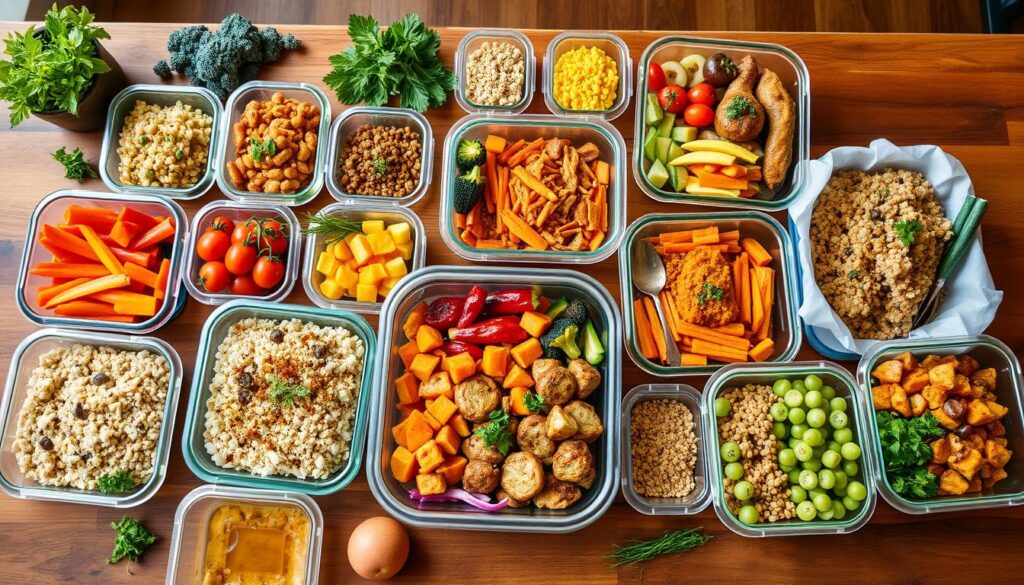
| Meal | Preparation Time | Storage Duration |
|---|---|---|
| Cheese Quesadillas with Peppers & Onions | 15 minutes | Up to 5 days |
| One-Pot Spinach, Chicken Sausage & Feta Pasta | 12 minutes | Up to 5 days |
| Easy Chicken Enchilada Casserole | 8 minutes | Up to 5 days |
| Philly Cheese Steak Sloppy Joes + Spinach Salad | 25 minutes | Up to 5 days |
| Slow-Cooker Pasta e Fagioli Soup Freezer Pack | 10 minutes | Up to 5 days |
Implementing these best practices can turn meal prepping into an enjoyable routine that enhances your culinary skills and promotes healthier eating. With a strategic weekly meal menu and thoughtful recipe selection, you can savor the benefits of preparation throughout the week.
Shopping Tips for Meal Prep Success
Effective meal prep begins with strategic shopping, making your grocery trips more productive and budget-friendly. By incorporating meal prep shopping tips, you can maximize your time and budget while ensuring you have everything you need for your week ahead.
Bulk Buying Essentials
Bulk purchasing for meal prep can greatly enhance your efficiency and cost-saving efforts. Opt for staple items such as:
- Grains like quinoa, brown rice, and oats
- Canned goods such as beans, tomatoes, and coconut milk
- Baking supplies including flour and sweeteners
- Frozen proteins which can be useful for various recipes
These items typically have long shelf lives and can be easily incorporated into multiple recipes throughout the week. The upfront investment in bulk purchasing saves you money in the long run, making it a fundamental part of your meal prep shopping tips.
Using Grocery Lists Effectively
Creating a well-organized grocery list will help you stick to your meal plan and avoid unnecessary impulse buys. Here’s how to utilize your grocery list effectively:
- List ingredients necessary for your specific recipes.
- Group items based on sections in the store, reducing the time spent shopping.
- Include popular items that you frequently use and might be running low on.
Consider taking advantage of grocery delivery or pickup services to save time. This approach supports the theme of meal prep by allowing you to focus more on preparing and cooking rather than shopping. Make sure to regularly stock up on pantry essentials so you’re always prepared for your meal prep days.
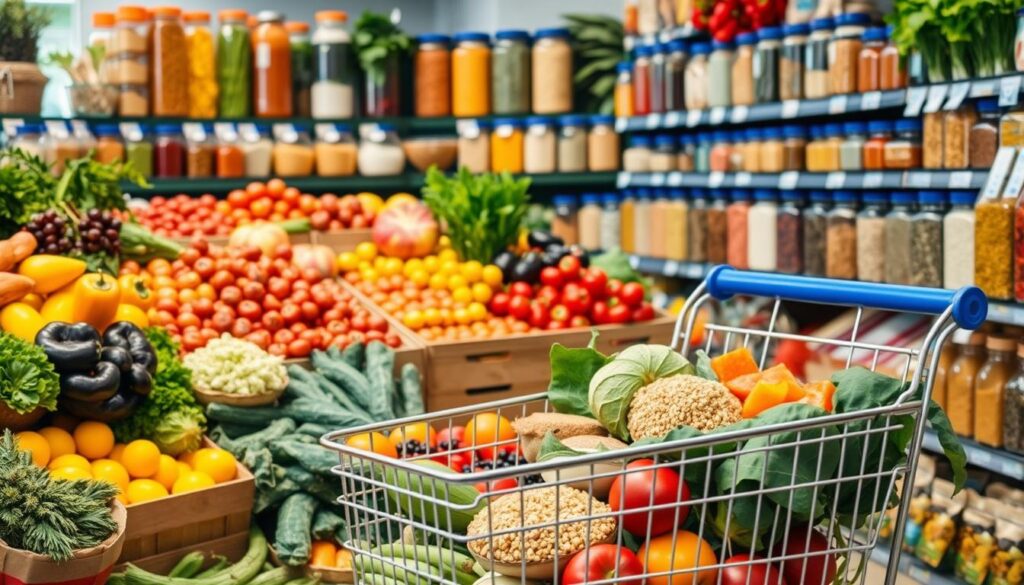
Effective meal prep entails more than just cooking ahead. It encompasses careful planning and strategic shopping to ensure you are set up for success throughout the week. Incorporating these bulk purchasing strategies and utilizing grocery lists will streamline your grocery trips, making meal prepping a satisfying and rewarding endeavor.
Preparing Ingredients for Easy Meal Assembly
Ingredient preparation plays a vital role in speeding up your weeknight cooking. Allocating just one hour on the weekend to prep can dramatically simplify meal assembly during those busy evenings. By dividing tasks into manageable portions, you set yourself up for culinary success throughout the week.
Start by focusing on essential proteins, including chicken, steak, legumes, and tofu. These form the backbone of many meals you’ll enjoy. Grains such as rice, quinoa, and pasta can be cooked and stored, allowing you to build a hearty foundation for your dishes. Onions, garlic, ginger, bell peppers, and kale are vegetables worth chopping in advance, making them ready for any recipe that comes your way.

Don’t forget about sauces, dressings, and dips. Preparing these items in advance not only enhances your meals but also streamlines the cooking process. Grating cheese ahead of time and creating spice blends can further expedite the task at hand. With organized ingredient preparation, creating diverse meals becomes an effortless endeavor.
A typical grocery list may include whole chicken, wild-caught salmon, seasonal vegetables, and a variety of legumes and grains. These ingredients can easily be transformed into satisfying meals with minimal effort. For example, a spatchcocked chicken can serve multiple purposes, providing protein for salads, tacos, and even cozy soups or chili.
By investing a bit of time upfront to prepare, you change your cooking game for the week. When skipped, many find themselves resorting to dining out or spending excessive time in the kitchen. Planning just a few meals each week can lead to stress reduction and a more enjoyable cooking experience.
Make-Ahead Meals and Batch Cooking Ideas
Batch cooking and make-ahead meals present perfect solutions for busy lifestyles. By investing time in the kitchen one day, you can effortlessly enjoy delicious meals throughout the week. Popular batch cooking techniques allow for the preparation of significant quantities of food that store well, making them ideal for reheating later. Recipes such as stews, soups, and casseroles not only provide ample servings but also tend to develop deeper flavors over time.
Popular Batch Cooking Techniques
Adopting various batch cooking techniques can significantly ease your weekly meal prep. Here are some of the most practical approaches:
- Slow Cooker or Crockpot: Ideal for stews and soups that simmer for hours, enhancing flavors while you focus on other tasks.
- Freezing Leftovers: Convenient for meals that can be portioned and stored for future use. Nearly one in four recipes emphasizes this method for practicality.
- Quick Cooking Techniques: Aim for recipes that require minimal time to prepare, catering to time constraints. A significant portion of meal prep recipes maintains simplicity.
- Creative Leftover Transformations: About one in ten recipes offer ideas to refresh leftovers, providing an exciting twist to already prepared meals.
Recipes for Make-Ahead Meals
Gathering reliable recipes for make-ahead meals can streamline your meal prep process. Here are some favorites that reheat well:
| Meal Type | Recipe Name | Key Ingredients |
|---|---|---|
| Dinner | Spaghetti Meat Sauce | Diced tomatoes, tomato sauce, Italian seasoning, onion, garlic |
| Breakfast | Banana Oat Muffins | Oats, bananas, eggs, honey |
| Lunch | Extra-Stuffed Taquitos | Chicken, beans, cheese, tortillas |
| Side Dish | Sour Cream Chicken Enchiladas | Chicken, sour cream, tortillas, cheese |

By incorporating these make-ahead meals and employing effective batch cooking techniques, you not only save time during the week but also enjoy a heartier variety of nutrition. Take advantage of these strategies to elevate your meal prep game and ensure a smooth culinary experience each week. For quick meal prep ideas, consider preparing large batches of grains, beans, and proteins at the beginning of the week. You can then mix and match these components to create a variety of satisfying and healthy meals throughout the week. Additionally, investing in quality food storage containers can help prolong the shelf life of your prepped ingredients, making it even easier to grab a nutritious meal on busy days.
Storing and Reheating Prepared Meals
Understanding proper meal storage tips is essential for maintaining the flavor and safety of your prepared meals. Begin by ensuring that your fridge is set to a temperature below 40°F (4°C). This helps prevent bacterial growth and keeps your food fresh. Once you finish cooking, allow hot food to cool for about 30 minutes before transferring it into airtight containers. This approach helps avoid condensation that could lead to spoilage.
When it comes to storing specific ingredients, keep in mind that red meat, poultry, and seafood typically last three to five days in the fridge. Whole fruits and vegetables enjoy a longer lifespan compared to cut produce, which can wilt quickly. Freezer storage, set to 0°F (-18°C), is a viable option for extending the shelf life of your meals for several months, depending on the ingredients used.
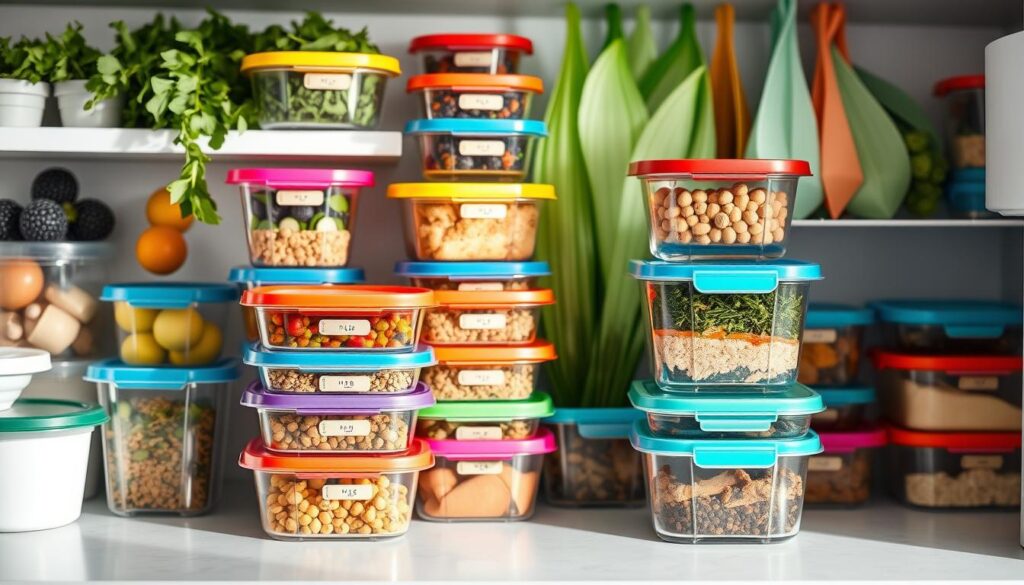
Reheating prepared meals can be straightforward if you follow best practices. Always heat your food to an internal temperature of about 165°F (74°C) to ensure it’s safe to eat. If you undercook some ingredients during meal prep, it can lead to easier reheating without overcooking or creating sogginess. When reheating on the stove, consider adding a bit of water to help maintain moisture.
Prioritizing older meals for consumption limits waste. Keep an eye on your prepared meals and adjust your portion sizes during reheating, ensuring even heating throughout. With these meal storage tips and guidelines for reheating prepared meals, you can enjoy food that tastes just as great as the day it was made.
Conclusion
In summary, embracing meal prepping can significantly enhance your weekly routine. The benefits of meal prepping are numerous; from saving time and money to fostering healthier dietary choices, this practice streamlines your cooking process and reduces stress. By incorporating meal prep into your life, you’re not just creating meals but establishing a healthier lifestyle that encourages you to prioritize well-balanced food.
Planning and preparing meals in advance allows you to enjoy budget-friendly options, with families often managing costs as low as $50 per week. Furthermore, purchasing ingredients in bulk contributes to significant savings while minimizing food waste. When you commit to regular meal prepping, reports indicate you could save up to 25% on your grocery bills while enhancing dietary variety by 20%.
As you develop a meal prepping habit, you’ll find that your food choices improve, leading to a diet with more whole foods and vegetables. You’ll also likely experience a noteworthy reduction in weekly stress levels, allowing you more time to enjoy meals with family or explore new recipes. Embrace the advantages of meal prepping by making it an integral part of your lifestyle, and reap its many rewards for your health and productivity.
